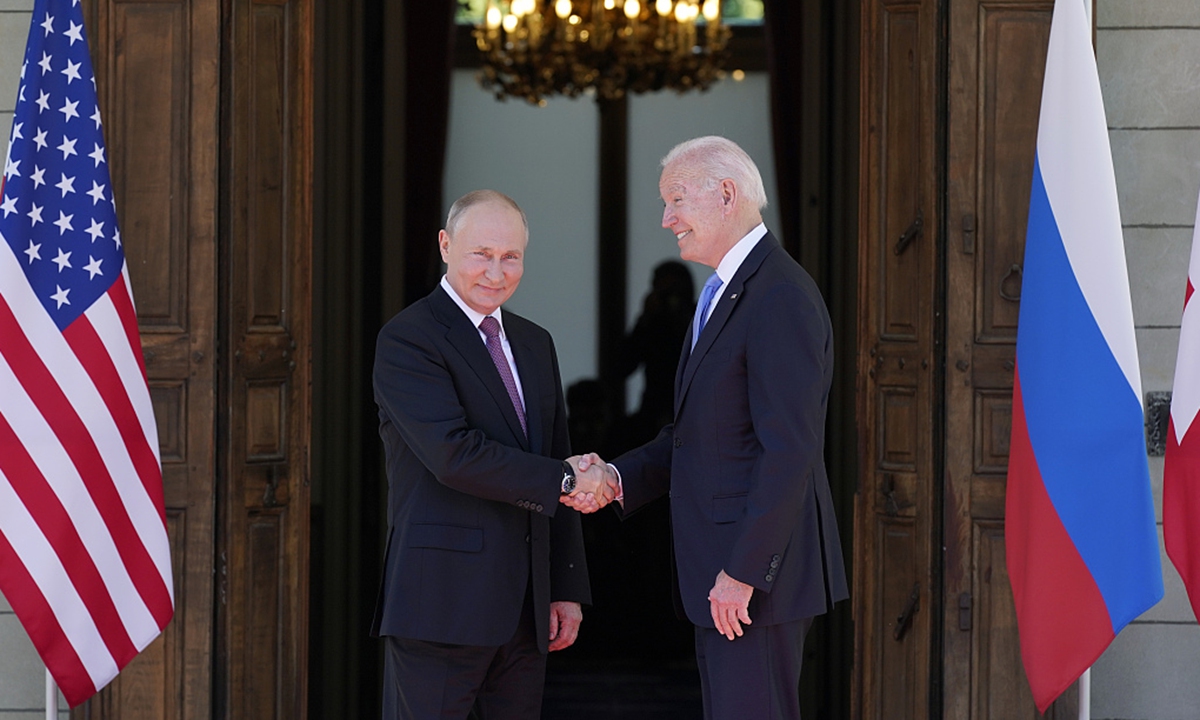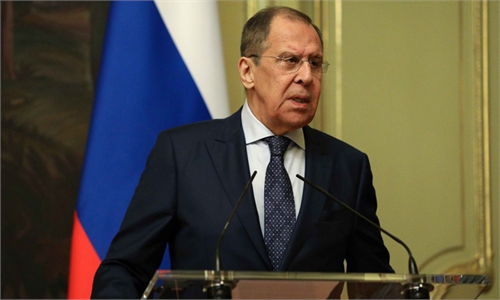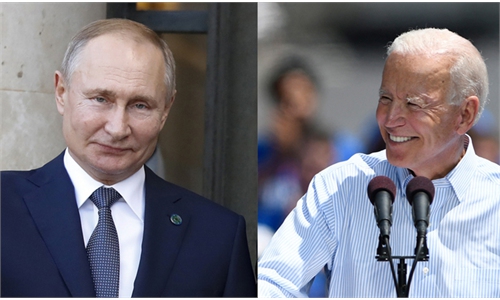
US President Joe Biden and Russian President Vladimir Putin shake hands at the Villa la Grange on Wednesday in Geneva, Switzerland. Photo: VCG
Russian President Vladimir Putin and his US counterpart Joe Biden held their first summit in Geneva, Switzerland on Wednesday. After the meeting, Putin said in his one-man press conference that his encounter with Biden was "constructive," and that both countries had agreed their ambassadors would return to their posts in Moscow and Washington. This meeting clearly shows that both sides have the will to stop the worsening US-Russia relationship which is "at a post-Cold War low." Compared with the two countries' mutual hostility, this is already an adjustment. In this sense, the smooth holding of the meeting itself can be regarded as an achievement.
Putin also said that the two countries discussed a number of topics including strategic stability, trade relations, regional security and cybersecurity.
However, the US and Russia have fundamental differences on issues such as Ukraine, Syria, Belarus and human rights, which can hardly be resolved in just one meeting. When former US presidents Donald Trump and Barack Obama entered the White House, they both showed a public willingness to restart US-Russia relations. But when they left the Oval Office, the bilateral relations worsened. When Biden came into power, the language he used on Russia was even tougher than those of his two predecessors. Biden is obviously the new president who is more "anti-Russia." But he has an additional motivation to ease the US-Russia tensions - he wants to concentrate on dealing with China now.
But as Russia is too big and too powerful, the US-Russia relationship is not a simple game in which Washington can make any adjustment at will. Regarding the important differences between Russia and the US, no matter which side makes a concession, it will lead to a major impact.
Most importantly, there is a problem with the US' attitude toward its differences with Russia. The US has formed an oppressive attitude on Russia, which lacks basic respect. After the disintegration of the Soviet Union, the US has shown its arrogance and tough stance as a victorious nation. Washington implemented NATO's eastward expansion that frantically squeezed Moscow's strategic space, and frequently led allies to jointly impose sanctions on and humiliate Moscow. The summit was clearly not the end of Washington's bad attitude, as Putin reportedly said, "I did not have any illusions to begin with. They do not and cannot exist."
In the field of cybersecurity and human rights, Washington has arbitrarily convicted Moscow, and there is no equality between these two major powers at all.
The US has talked about Russia's "aggressiveness," but it is mostly Russia's resistance at the red line when being squeezed by the US and other Western countries. In fact, Russia has nowhere to retreat. To ease US-Russia relations, the only method is Washington taking a step or even a few steps back. Meanwhile, the US needs to warn its allies, especially the newly recruited ones, to restrain their anti-Russia attitude and restore Russia's due international environment and strategic room.
However, it is clear that Washington is reluctant to make such a substantive strategic adjustment. It is trying to achieve two things at once. One is to maintain European countries' anti-Russia mentality as well as their loyalty to the US, and the other is to reassure Russia to accept the status quo and shut the Russia up while consolidating the gains of NATO's eastward expansion. The gap between the US and Russia's expectations of the order in Eurasia is too wide to be reconciled.
Biden's invitation to Putin for a summit soon after he described Putin as a "killer" suggests that he feels the US cannot afford to deteriorate relations with both China and Russia at the same time. The US wants to stabilize Russia to a certain extent, but with only empty words and no action. It was an attempt to scratch out a big deal with little effort.
The fact that Biden has made his meeting with Putin a real one is an achievement in itself but the US-Russia summit may go only so far. There might be a short period of stability, but if the US does not adjust its basic attitude toward Russia and only demands that Russia abide by the post-Cold War rules set by the US and the West, the relationship is bound to suffer periodic oscillation.
As members of a "strategic triangle," China, the US and Russia have displayed several types of relations since the end of the Cold War. One is the comprehensive cooperation between China and Russia, the second is the cooperation over competition between China and the US for a long time, and the third is the serious antagonistic relationship between the US on one side and China and Russia on the other. The relationship between great powers should at least reach the same level as the relationship between China and the US before their ties deteriorated in recent years. The current bad relations between the US and China plus Russia are entirely the result of Washington's hegemony. As long as the US still upholds its hegemony, there will not be true global peace and stability.


